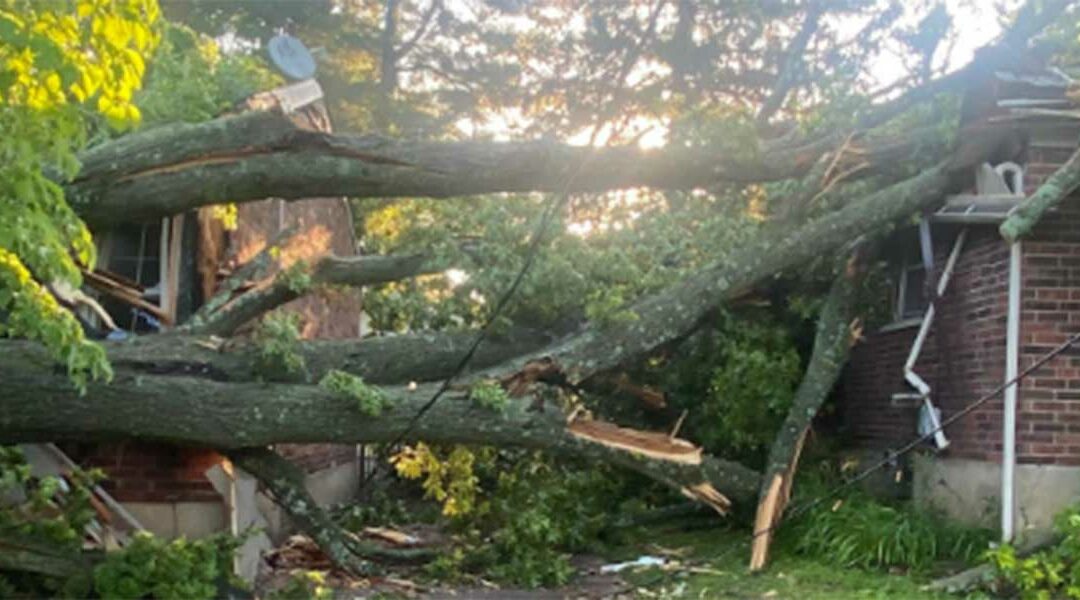If you’ve ever seen a large tree suddenly uprooted during a storm, you may have wondered how things got to that point. While it might seem like a random tree problem, there are usually several contributing factors below the surface.
As professional tree services in Crestwood, KY, New Leaf Tree Service shares the following reasons why even big trees fall down without warning — and how to stop it from happening.
1. Strong Winds and Sudden Storms Topple Trees
The thunderstorms Kentucky faces in spring and summer often bring strong winds over 50 mph. That force places enormous pressure on a tree’s canopy. If the tree has weak or shallow roots, internal decay, or an unbalanced structure, it will be highly susceptible to sudden failure in these conditions.
Think of the tree’s canopy as a sail. When gusts hit, that force pushes down through the trunk to the base. If the roots can’t hold them in place, these trees fall down.
2. Saturated Soil Reduces Root Support
Soil becomes soft and unstable as heavy rainfall saturates the ground, compromising the structure needed to hold roots in place. This problem arises fairly often in Crestwood, where we get around 45 inches of rain per year. Some areas also have dense clay soil.
After several days of rain, even a moderate windstorm can bring down large, mature trees. The longer a yard stays waterlogged, the higher the risk of trees coming down.
3. Soil Erosion Affects Slopes and Creek Beds
Trees located near sloped landscapes, creeks, or construction sites can experience a gradual loss of the soil surrounding their roots. Over time, this weakens the trees’ anchoring systems.
Whether the neighborhood in Crestwood has a new development or a natural hillside, erosion happens slowly. The tree’s end result is the same – one strong gust or sustained heavy rain might be enough to tip the balance.
4. Fungal Infection and Wet Conditions Cause Root Rot
Root rot often happens due to fungi that thrive in overly wet soil, which is common in Kentucky’s humid summers. Trees growing in compacted or poorly draining soil are especially at risk.
The decay starts underground. By the time symptoms appear — like thinning leaves or early leaf drop — that disease damage has advanced. If a storm hits, these trees often can’t stay standing.
5. Trees Fall Down After Improper Planting
Trees planted too deep, in poor soil, or too close to structures can’t develop strong, stable root systems. Girdling roots or shallow root spread compromise a tree’s ability to anchor itself.
Uninformed developers may install trees in residential areas without proper techniques. While the trees look healthy for a few years, poor planting practices soon catch up with them. Badly anchored trees quickly turn into hazards during storms.
6. Tree Disease Weakens Structure From Within
Several tree diseases in Kentucky cause hidden structural weakness. Oak wilt, Dutch elm disease, or bacterial leaf scorch will attack the tree’s internal systems. The symptoms aren’t always visible until it’s too late.
If you’re seeing warning signs of tree weakness, don’t ignore them. Why not have an arborist inspect your trees? If they’re near your house or other structures, trees need to be as stable as possible.
Protect Your Property in Crestwood With Help From New Leaf Tree Service
Those are some common reasons trees fall down, and the solutions involve proper tree care and an expert eye. New Leaf Tree Service serves Crestwood, Kentucky, and the Louisville region with just such expert tree inspections, including safe removals where needed. Check out our ISA-certified arborists’ spring tree care checklist for maintenance tips, or get in touch!
Don’t wait for storm damage to topple your tree – call us at (502) 419-9899!

